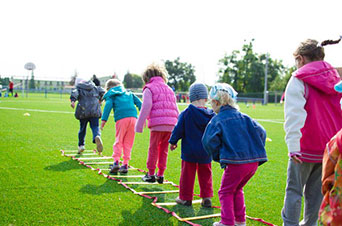How To Help a Child Focus and Pay Attention
All children have difficulty paying attention sometimes because they live in a busy world with many distractions. Parents also need to keep in mind that temperament and attention span can vary widely from one child to the next, even among siblings. This is part of what makes us human and doesn’t necessarily need to be a negative thing.
Even when you love and accept who your child is as an individual, you may be tired of negative reports from school that he or she misses assignments or has behavioral challenges due to not paying attention. Your child’s doctor may have even suggested starting medication to improve attention span and focus. Perhaps you feel uncomfortable with the idea of your child taking medication and want to know how to help your child focus naturally. The good news is that dozens of potential solutions exist for this common problem.
Determine if the Issue is Lack of Focus or Lack of Interest

Sometimes parents worry about how to help their child focus without medication when focus isn’t the real problem. The child may focus fine when he or she finds the topic interesting but tends to daydream if the topic seems boring. In the case of disinterest, you, your child’s teacher, and other caregivers may need to adjust the approach to help him or her become more engaged. Some possible solutions here include:
- Allowing the child more freedom of movement.
- Encouraging the child to ask as many questions as necessary until he or she understands the material presented.
- Giving the child opportunities to create through art or music in addition to simply listening to new information.
Since this will not always be possible, it’s important to brainstorm with your child to come up with ways to stay focused on the material even when it holds little interest. Explain that we sometimes need to do things we do not like because that is part of learning to become an adult. You can help teach your child self-motivation by encouraging him or her to come up with a small reward for paying attention to an uninteresting topic.
Encourage Movement and Time Outside

Children are not trying to be difficult when they become fidgety or get up and move about the room. It is a scientifically proven fact that kids need to move more because they do not yet have the patience or maturity to sit still for long periods of time. This is the reason why most elementary schools budget time for outdoor recess during the school day. Nature is soothing to many children because it offers stimulation, different sensory inputs and textures, and vibrant color.
When weather does not permit outdoor play, kids should at least have the chance to get some of their wiggles out indoors. Creating a movement zone for this specific purpose can work wonders for improving a child’s focus and attention span.
Evaluate Your Child’s Diet

Good nutrition can help to rewire your child’s brain and improve cognitive skills, including memory and focus. Serving meals and snacks at consistent times is another thing you can do to help improve focus. Kids thrive on routine and knowing what to expect. When they trust they will eat at a certain time and know that the food is good for their body, they are more likely to want to succeed at school, home, and with extra-curricular activities.
Structured mealtimes help children avoid eating whatever they can find or binging because they have gotten too hungry. Taking in too much sugar can increase both hyperactivity and inattention. In fact, some nutritionists recommend reducing or eliminating sugar along with dairy products and gluten if kids have attention issues. This is true whether the child has received a diagnosis of attention deficit disorder (ADD) or attention deficit hyperactivity disorder (ADHD) or not.
Make Sure Your Child Gets Enough Sleep Every Night

The lives of children can become just as hectic and stressful as adults. Some kids are in school all day, rush off to extra-curricular activities right after school, and complete hours of homework every night. Keeping up with a schedule like this cuts into sleep time, making it much more likely that a child will struggle to pay attention due to fatigue. One of the best decisions you can make for your child is not to overschedule him or her and to insist on an early bedtime.
According to the Centers for Disease Control and Prevention, children in elementary school should average 10 hours of sleep a night. Preschoolers need 11 to 12 hours of sleep while kids in middle school or high school should get around nine hours of sleep every night. Remember that your child’s body is growing and his or her mind is expanding. Getting enough rest is essential to stay healthy and stay on track with learning.
Limit Screen Time

The definition of screen time includes sitting in front of or interacting with a television, computer, video game, tablet, or smartphone. Both adults and children in the United States have too much screen time, but it is especially harmful for kids with developing brains. Excessive screen time in children can create the following problems:
- Difficulty paying attention
- Obesity
- Speech delay
- Increased behavioral issues and risky behavior
- Lower achievement in school
The American Academy of Pediatrics (AAP) states that preschool aged children from three to five years old are at greatest risk of reading and language skill deficits from too much screen time. Using these devices at such a young age can change the regions of the brain responsible for helping children acquire and use these skills. Here are the AAP guidelines for screen time based on a child’s age:
- Birth to 24 months: Parents of infants and young toddlers should avoid all screen time if possible. The one exception the AAP makes is video calls with grandparents and other important people in the child’s life.
- Ages 2 to 5: Children in this age group should not exceed one hour of screen time per day, especially when it requires them to be completely sedentary. The content they view should be high quality and educational.
- Ages 6+: Parents should establish a screen time limit for each child over age six based on that child’s personality, sense of responsibility, and any attention issues. Time spent using these devices should never interfere with sleep, school, exercise, or healthy habits.
If you have been struggling for a long time with how to help child focus and pay attention, you may be surprised at what a difference it can make to limit time spent staring at electronic devices.
Teach Your Child to Work through Frustration

Learning is hard work, and it is unrealistic to expect children not to become frustrated when trying to master a new skill or information. Explain to your child that everyone feels frustrated at times but sticking with it is important to find a solution. Be sure to help your child name his or her feelings without labeling them as good or bad. You also want to be mindful of your own example when it comes to dealing with frustration. This helps children learn self-control that can carry over to improved focus at school and at home.
It can be challenging to see your child struggle to focus and pay attention. However, you must remain committed to determining the cause and trying various solutions until you find the ones that work.





